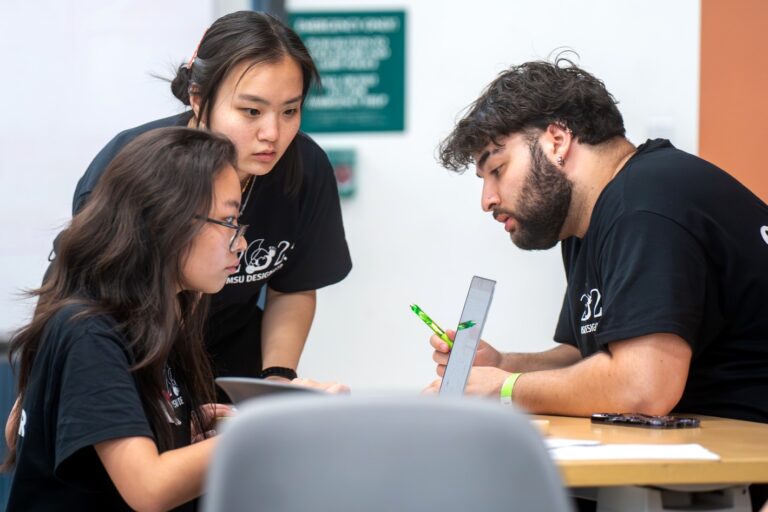Alex Vonhof, a Michigan State University Honors College student pursuing a BFA in Studio Art with a concentration in Electronic Art and Intermedia, debuted his short video, Breathe, as part of the 2022 CREATE! Micro-Grant Virtual Student Exhibition, which showcases the 12 projects that each received $500 in CREATE! Micro-Grant funding this past year.
“Breathe explores the effect of the perpetual anxiety around breath and breathing brought on by the advent of the pandemic,” Vonhof said. “This anxiety has distorted how we view ourselves, interact with others, and exist in the world after being continually confronted with exponentially mounting deaths and the incessant spread of the SARS-CoV-2 virus.”

The CREATE! Micro-Grant initiative encourages students to respond critically and imaginatively to events occurring during the COVID-19 pandemic and to creatively explore the issues of their generation. The goal is to critically engage, through art, with the past, present, or future of the ongoing COVID-19 pandemic.
Utilizing software he acquired with the micro-grant funding, Vonhof created a multitude of layers and textures by reproducing fragments of his face over distorted audio of his breath to illustrate the universal emotions of fear, isolation, and uncertainty present at the height of the pandemic.
“The completion of this project would not have been possible without the CREATE! Micro-Grant. With the funding, I was able to purchase TouchDesigner…The purchase of this program not only allowed me to complete this project but will provide access to this incredibly important technology for years to come.”
“The completion of this project would not have been possible without the CREATE! Micro-Grant,” he said. “With the funding, I was able to purchase TouchDesigner, a software developed by Derivative to control node-based visual programming language. This program is one of, if not the most, important software for the creation of multimedia and/or video projects, but this comes at a substantial cost, which was greatly reduced due to the funding provided by the micro-grant. The purchase of this program not only allowed me to complete this project but will provide access to this incredibly important technology for years to come. This establishes an important foundation from which to build a practice in the multimedia arts, and for that, I am incredibly thankful.”
Originally from Edmonton, Alberta, Canada, Vonhof is an interdisciplinary artist working in sound, installation, and performance at the intersection of science and art.
“I examine the relationship between humanity and the natural space; the ways that we treat or, more accurately, mistreat the world,” he said. “I am concerned with the inactivity of ruling bodies and the general populous in response to the climate emergency. My work is intended to generate the discontent, anger, and agency that is prerequisite to any widespread pattern of change.”
Although Vonhof says it was “incredibly difficult” to find the inspiration and drive to create during the pandemic, he was able to find strength and success and continued working in the face of adversity.
“We all were living monotonous lives and, therefore, it was incredibly easy to become stagnant in artistic practice,” he said. “The solution I found was to pour myself into my work and, through that, find the passion and excitement that was so lacking in everyday life. This was, without a doubt, the most important lesson I learned from working during the pandemic.”
“Having the cost of a project stand in the way of an amazing idea is something that student artists have to face regularly and inhibits the growth of each individual artist. This should never be the case and is part of the reason this program is so successful and attracts so many applicants.”
In 2021, Vonhof participated in the inaugural international class of the Ars Electronica Festival University in Linz, Austria. He also has exhibited at the Eli and Edythe Broad Art Museum, SCENE Metrospace, Kresge Art Center Galleries, the Electronic Art & Intermedia Festival, and at several performance venues across Michigan. He was awarded Best in Show at the Department of Art, Art History, and Design Undergraduate Exhibition, a First Place Award in Visual Arts at MSU’s University Undergraduate Research and Arts Forum, and a grant for public artwork from the MSU Federal Credit Union.
Reflecting on his experience with the CREATE! Micro-Grant Program, Vonhof encourages a shift to include other global challenges as the program continues to grow and evolve.
“Having the cost of a project stand in the way of an amazing idea is something that student artists have to face regularly and inhibits the growth of each individual artist. This should never be the case and is part of the reason this program is so successful and attracts so many applicants,” Vonhof said. “The CREATE! Micro-Grant program should absolutely be continued for the future, but I would encourage a shift in thinking away from projects only dealing with the pandemic to a more open call addressing the plethora of global challenges that we as a society are currently facing.”
Written by Kseniya Lukiy


